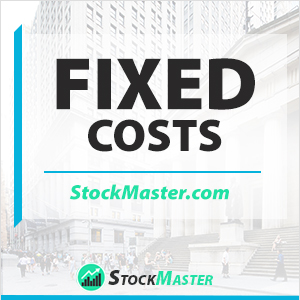 What is a Fixed Cost?
What is a Fixed Cost?
Definition: A fixed cost is one of the main expenses that firms, engaged in the production of goods and services, incur. Unlike other costs, fixed costs remain constant and do not change even with a change in production volume. As the cost remains constant, they must be paid independent of any business activity.
Fixed costs vary from one company to another. Some firms have high fixed costs, given the high levels of production involved that require large equipment as well as space requirements. Likewise, small businesses will also have fixed cots regardless of the level of business activity that takes place.
In production, managers split costs into two; Variable and fixed costs. The two type’s costs make up the total cost structure of any firm. Unlike variable costs, fixed costs are uncontrollable, as they are not related to production.
Fixed Cost Example Calculation
To determine the fixed cost of firm accountants, sum up all the costs that change throughout an accounting period. Some of the common fixed costs that businesses incur, used in the calculation of the total fixed costs include rent, salaries as well as insurance and equipment leased.
Rent is considered a fixed cost as it will always remain constant as per the agreed terms with a property owner. If a business owner, rents a 1,000 square feet space for $40 a square foot for ten years, the monthly rent would remain $40,000 for the entire ten years, regardless of the volumes that the firm produces.
However, it is important to note that fixed costs do not remain constant forever. In the case of rent, a property owner might decide to increase the rent-charge upon the expiry of the current lease agreement.
Fixed Costs vs. Variable Costs
It is important to distinguish variable and fixed costs if a business owner is to have a clear understanding of how various costs affect the levels of production. The breakdown of the two costs goes a long way in helping businesses set the appropriate prices for goods and services.
Fixed and variable costs are the two types of costs that businesses incur. However, the two differ a great deal. While fixed costs remain constant for a period irrespective of volume produced, variable costs vary. Variable costs are essentially costs that firms incur that vary based on production volumes. Similarly, the costs change proportionally depending on business activity or volume.
In addition, fixed costs are incurred regardless of their being production or not. Variable costs, on the other hand, can be nil in case there is no production activity.
Fixed costs are often referred to as overhead costs or supplementary costs. Variable costs, on the other hand, are referred to as prime costs or direct costs as they affect the level of output.
While fixed costs are time-related given their ability to remain constant over a given period, variable costs are volume related as they fluctuate depending on the level or production
Fixed Cost Advantages
Fixed costs bring about a level of stability in business, given their ability to remain constant throughout a given period. Likewise, the costs are easier to account for, as they are known beforehand. In contrast, it is impossible to account for variable costs as they fluctuate a lot.
While the total fixed costs won’t decrease even with a decline in production levels, their impact tends to be insignificant in case of increased levels of production. Consequently, the average cost per unit decreases with an increase in output.
Fixed Cost Disadvantages
The impact of a fixed cost can be significant leading to huge losses on output decreasing significantly.
Likewise, the decrease of the market price of a fixed cost item can make it difficult for a firm to remain price competitive.
